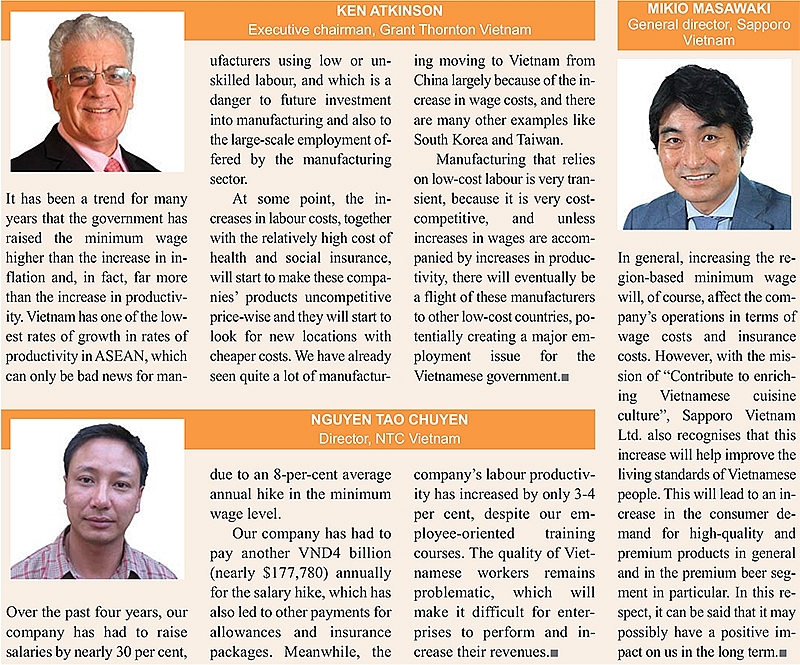Wages rising ahead of productivity
 |
| The increases in wages in Vietnam do not align with the improvement in labour productivity Photo: Le Toan |
Malaysia’s largest online employment company JobStreet.com released its “2018 annual salary increment trends” survey results last week, with a total of 4,463 candidates and 599 employers having participated. It revealed that in Southeast Asia, Vietnamese employees receive the highest average annual salary increases at 14 per cent, with Thailand the lowest at 5 per cent. The regional average is 8 per cent.
“In Vietnam, almost seven out of 10 (66 per cent) employees received an annual salary increase in early 2018. The current average salary increment rate is the highest in the region, indicating that salaries are rising far ahead of the inflation rate that is at 4 per cent,” stated the report. “For employees who were promoted last year, about 43 per cent received a significant salary increment of 22 per cent compared to the non-promoted employees, who got an average of 7 per cent.”
Kenichi Ohno, an economist from Japan’s National Graduate Institute for Policy Studies, told VIR that a rise in wages and low productivity are among the biggest concerns for firms in Vietnam.
“Labour productivity remains almost the same as 20 years ago,” said Ohno, who has been co-operating with the Vietnamese government and ministries in plans to improve the economy’s competitiveness and lure foreign direct investment (FDI), for 22 years.
“While Vietnam remains slow in developing its technology, building supporting industries, and increasing labour productivity, salaries keep increasing strongly. This will make it difficult for Vietnam to lure FDI in the near future,” Ohno said
According to Nguyen Duc Thanh, head of the Vietnam Institute for Economic and Policy Research (VEPR), in Vietnam, minimum wage adjustments should be in line with labour productivity growth.
“The minimum wage has been increasing at a high level over the past decade. It will be likely to have greater negative effects on employment, and, more importantly, erode Vietnamese firms’ competitiveness if minimum wage increases continue outpacing labour productivity,” Thanh said.
This week, the National Wage Council will finalise a rise in the regional minimum wage for 2019. It is expected that the rise will be about 6-7 per cent, to be determined by the government. The rise has been proposed to be 7.5-8 per cent, or an additional VND220,000-330,000 ($9.77-14.66) per month. This year, the rate was 6.5 per cent.
In a recent survey by the Japan External Trade Organization (JETRO) on Japan’s performance in 19 economies, 75.5 per cent of respondents said that they were worried about an uptrend in growing wage-based costs in Vietnam. Vietnam causes the third-highest rate of concern, after Indonesia (82.2 per cent) and China (77.8 per cent).
“The average minimum wage in Vietnam has been increasing by 8 per cent a year. Although the labour cost in general remains lower than in other nations, that in the manufacturing sector for engineers and managers has been strongly ascending,” said Hironobu Kitagawa, chief representative of JETRO Hanoi. “The labour cost in the non-manufacturing sector for staff and managers has also been increasing strongly.”
The Japan International Cooperation Agency and the VEPR recently also released a survey on labour productivity and wage growth in Vietnam, which showed that Vietnam’s labour productivity has risen by 4.4 per cent since 2004.
“However, the country’s average wage growth is the highest in the region and has outpaced the productivity growth rate,” said Thanh from the VEPR. “This will heavily affect the economy’s competitiveness and attraction of FDI.”
 |
According to this survey, a hike in the minimum wage has induced an increase in the average wage and a reduction in employment and profits. On average, a 1-per-cent increase in the minimum wage may result in a 0.32-per-cent climb in the average wage and a 0.13-per-cent decrease in employment. In terms of profits, negative and significant impacts are found in the private sector. Specifically, a 100-per-cent increase in the minimum wage tends to lower the profit rates by 3.25 percentage points.
According to Ohno, the minimum wage is a tool to support less advantageous workers, but the fundamental problem indeed lies in labour productivity in general.
“Without a steady improvement in productivity, the effort of the increasing minimum wage will be more likely to gradually diminish the competitiveness of the economy, causing greater unemployment. Therefore, it is essential for the Vietnamese government to put top priority on promoting productivity in the medium and long term,” he said.
According to the VEPR, the minimum wage does not appear to be effective as a social protection policy. As the current minimum wage system does not adequately cover those without labour contracts and those who are more vulnerable and disadvantaged, it is worth considering complementary policies to function as social security for those who are not covered by minimum wage-based policies.
What the stars mean:
★ Poor ★ ★ Promising ★★★ Good ★★★★ Very good ★★★★★ Exceptional
 Tag:
Tag:
Related Contents
Latest News
More News
- State corporations poised to drive 2026 growth (February 03, 2026 | 13:58)
- Why high-tech talent will define Vietnam’s growth (February 02, 2026 | 10:47)
- FMCG resilience amid varying storms (February 02, 2026 | 10:00)
- Customs reforms strengthen business confidence, support trade growth (February 01, 2026 | 08:20)
- Vietnam and US to launch sixth trade negotiation round (January 30, 2026 | 15:19)
- Digital publishing emerges as key growth driver in Vietnam (January 30, 2026 | 10:59)
- EVN signs key contract for Tri An hydropower expansion (January 30, 2026 | 10:57)
- Vietnam to lead trade growth in ASEAN (January 29, 2026 | 15:08)
- Carlsberg Vietnam delivers Lunar New Year support in central region (January 28, 2026 | 17:19)
- TikTok penalised $35,000 in Vietnam for consumer protection violations (January 28, 2026 | 17:15)





















 Mobile Version
Mobile Version